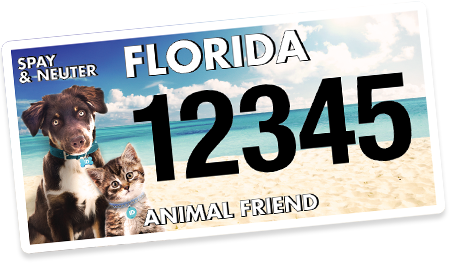
No. But we are among their biggest fans. Especially the low to no-cost spay/neuter shelters and clinics that we support through grants funded by sales of our specialty license plates.
Florida Animal Friend is a granting agency and not a spay/neuter provider.
The funds from every purchased plate and every separate donation add up to grants of up to $25,000 each for dozens of Florida nonprofit animal organizations working to end animal homelessness.
Each time you purchase a spay and neuter specialty license plate, Florida Animal Friend receives $25. We exclusively use that sum to fund free and low-cost spay and neuter programs across the state. And that doesn’t just apply to first-time plate purchases!
Spaying is for female animals and neutering is for males. By spaying a female, she cannot become pregnant and have millions of baby puppies or kittens. By neutering a male, he is unable to impregnate a female animal. Both are surgical procedures and these surgeries and the animals are under general anesthesia and cannot feel any pain. The term “fixed” is another term for saying that the animal has been either spayed or neutered.
According to the Humane Society of the United States, on any given day, 70,000 puppies and kittens are born. That’s thousands of newborn litters left without a home. By spaying and neutering our pets, we truly can “fix” the problem of pet overpopulation.
Evidence shows that females spayed before their first heat are typically healthier, even at the young age of eight weeks!
As adorable as one or two litters may be to children, imagine those animals being euthanized in animal shelters because they don’t have a home. Teach your children to value the miracle of life by spaying and neutering your pets.
One of every four pets brought to animal shelters are purebred. Purebred or not, all animals who haven’t been spayed or neutered contribute to the problem of pet overpopulation.
A dog’s natural instinct is to protect its home and family. Neutering or spaying your pet has no effect on your dog’s innate personality.
Unlike humans, dogs and cats do not have a sense of sexual identity. Your pet will not feel any less manly or masculine after being neutered.
It is highly unlikely and there is no guarantee that a puppy or kitten will be a carbon copy of your favorite pet. As cute as you believe your pet may be, there are thousands of even cuter, sweeter and lovable pets waiting to have a family and home of their own.
You may be one of the thousands of families who are responsible in finding their pets’ litters a home; however, what about those other families who aren’t? Thousands of puppies and kittens end up homeless and compete with other stranded animals for a home because families don’t know what to do with them.
There are hundreds of low-cost spay and neuter service facilities all over the United States and many non-profit organizations supporting them! Call your local veterinarian or animal shelter for a list of recommended facilities near you or click on the link below for organizations that can help.
Florida Animal Friend grants are typically awarded to programs that increase cat and dog sterilization above the existing baseline. The categories for funding are:
Funds are unlikely to be approved to replace existing program funding and will not be approved to fund surgeries that are likely to be performed whether or not Florida Animal Friend funding was available. For example, Florida law requires that animals adopted from shelters and rescue groups be sterilized, and most adoption programs are already compliant with this law. Therefore, proposals that seek funding for neuter-before-adoption projects will not be funded compared to projects that are likely to reach new target populations at high risk for contributing to cat and dog overpopulation.
Funds may not be used for capital expenses or for procedures not directly related to sterilization surgery, such as promotions, testing, transportation, and licensing. Funds may only be used for programs that comply with local city, county and state ordinances and laws. To support rabies vaccinations, $ 2 per animal spayed/neutered of the grant can be used for a rabies vaccination.
It is recognized that there are areas of the state that are under-served by existing spay/neuter opportunities. It is hoped that in these areas, veterinarians, animal control, local humane groups, and others will form collaborative efforts to create sterilization programs where none currently exist. In these circumstances, the grant proposal should outline the participating parties as well as which party will act as the lead organization. The lead organization, identified in the proposal, would submit the grant and must bear the responsibility for managing and fulfilling the grant request goals.
The following groups are eligible to apply for grants from Florida Animal Friend:
Note: Groups represented by current board members of Florida Animal Friend or current members of the grants committee are not eligible to apply during the term of service.